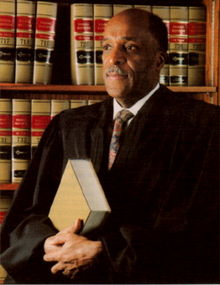Nathaniel R. Jones
| Nathaniel Jones | |
|---|---|
 |
|
| Judge of the United States Court of Appeals for the Sixth Circuit | |
|
In office October 5, 1979 – May 13, 1995 |
|
| Appointed by | Jimmy Carter |
| Preceded by | John Peck |
| Succeeded by | Guy Cole |
| Personal details | |
| Born |
May 12, 1926 Youngstown, Ohio, U.S. |
| Alma mater | Youngstown State University |
Nathaniel Raphael Jones (born May 12, 1926) has served as a lawyer, jurist, academic, and public servant. He was a judge on the U.S. Court of Appeals for the Sixth Circuit before his retirement in March 2002. As general counsel of the NAACP, he gained recognition for his legal efforts to end school segregation in the northern United States.
Jones was born in the Smoky Hollow district of Youngstown, Ohio, several blocks from a federal courthouse that now bears his name. He served with the U.S. Army Air Corps during World War II. After the war, he pursued his education at Youngstown State University, receiving his A.B. in 1951 and his LL.B. in 1956. Jones was admitted to the bar in 1957.
After four years in private practice, Jones served as Executive Director of the Fair Employment Practices Commission. In 1962, he became the first African American to be appointed as Assistant U.S. Attorney for the Northern District of Ohio in Cleveland. He held that position until his 1967 appointment as Assistant General Counsel to President Lyndon B. Johnson's National Advisory Commission on Civil Disorders (the Kerner Commission). Following his term with the Kerner Commission, Jones returned to private practice with the firm of Goldberg & Jones in Youngstown.
In 1969, he was asked to serve as general counsel of the NAACP by executive director Roy Wilkins. The following year, Jones was honored by more than 600 dignitaries at an NAACP recognition banquet held in Youngstown. In a keynote address, he described the situation of African Americans in the following terms: "We still live in the basement of the great society. We must keep plodding until we get what we are striving for". For the next nine years, Jones directed all NAACP litigation. In addition to personally arguing several cases in the U.S. Supreme Court, he coordinated national efforts to end northern school segregation, to defend affirmative action, and to inquire into discrimination against black servicemen in the U.S. military. He also successfully coordinated the NAACP's defense on First Amendment grounds in the Mississippi Boycott case.
...
Wikipedia
